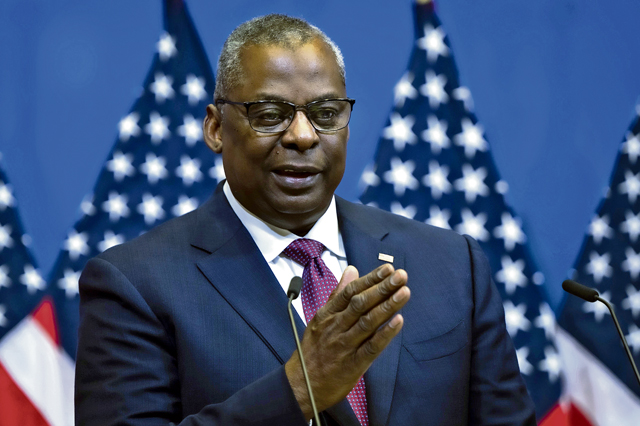
Representatives from more than 50 nations pledged to get more military capabilities into the hands of Ukrainian forces battling Russian invaders, Secretary of Defense Lloyd J. Austin III said today in Brussels.
Austin chaired the third meeting of the Ukraine Defense Contact Group. The group is looking to get Ukraine what it needs to fight the battle developing in the Donbas region of the country.
Austin and Joint Chiefs of Staff Chairman Army Gen. Mark A. Milley briefed the media at NATO headquarters following the meeting.
“I’m especially pleased that defense leaders from some 50 countries came together here today,” Austin said. “It’s a testament to the on-the-ground impact of this contact group that it continues to grow.”
Austin announced that President Joe Biden had approved a $1 billion security assistance package for Ukraine. This will include multiple launch rocket system munitions, 18 more 155 mm M777 towed howitzers and the tactical vehicles to tow them, and 36,000 rounds of 155 mm ammunition.
“This package also includes $650 million in Ukraine security assistance initiative funds that will help Ukraine defend itself with two additional Harpoon Coastal Defense Systems and thousands of secure radios, night vision devices, thermal sights and other optics,” the secretary said.
Allies and partners are also building Ukraine’s military capabilities. Austin said Germany will provide three multiple-launch rocket systems and guided MLRS munitions to Ukraine. “Slovakia announced a significant donation of MI-series helicopters and urgently needed rocket ammunition,” Austin said. “We also discussed important new artillery donations from many countries, including Canada, Poland and the Netherlands.”
To have military capability, there needs to be a weapon system, a trained crew and munitions. The contact group is working on the training portion of this equation.
“To date, we have trained 420 Ukrainians on the M777 howitzer, 300 Ukrainians on the self-propelled M109 [howitzer], 129 on the M113 armored personnel carrier, 100 on unmanned aerial systems, and 60 most recently graduated today on the [High Mobility Artillery Rocket System],” Milley said.
The contact group works hand-in-glove with Ukrainian defense leaders. Today, the Ukraine Defense Minister Oleksii Reznikov attended the meeting.
Milley said that since the start of the Russian invasion, the Ukrainians have asked for 10 battalions of artillery. “Twelve battalions of artillery were delivered,” he said. The contact group has also delivered 97,000 anti-tank systems. “That’s more than there are tanks in the world,” he said.
“They asked for 200 tanks; they got 237 tanks,” he continued. “They asked for 100 infantry fighting vehicles; they got over 300. We’ve delivered, roughly speaking, 1,600 or so air defense systems and about 60,000 air defense rounds.”
The HIMARS, or High Mobility Artillery Rocket System, will be an important addition to Ukraine’s arsenal. The U.S. military is training HIMARS crews one platoon at a time in Germany. “By the end of this month, we will transfer HIMARs systems, ammunition and trained crews for operational use in the defense of Ukraine,” Milley said.
Ukraine is making incredible sacrifices in defense of their country. “In the media, you see reported that Ukraine is taking 100 killed and 100 or 200 or 300 wounded per day,” he said. “I would say those are in the ballpark of our assessments.”
He was asked if Ukraine could sustain the fight in light of such losses. “For Ukraine, this is an existential threat,” Milley said. “They’re fighting for the very life of their country. So, your ability to endure suffering — your ability to endure casualties — is directly proportional to the object to be attained. If the object to be attained is survival of the country, then you’re going to sustain it — as long as they have leadership, and they have the means by which to fight.”
The Ukraine Defense Contact Group first came together in April at a meeting at Ramstein Air Base. There was a virtual meeting of the group last month. “Since the contact group first came together nearly three months ago, we built tremendous momentum for donations and delivery of military assistance,” Austin said. “And after this afternoon’s discussions, we’re not just going to maintain that momentum; we’re going to move even faster and push even harder.”
The group will look to deepen cooperation and coordination to get needed capabilities to Ukraine. “We’ll bolster Ukraine’s armed forces to help them repel Russian aggression now in the future,” the secretary said. “So we’ll continue working closely and intensively together with this contact group. We’ll keep on strengthening our support for Ukraine’s self-defense and will continue to stand up for the rules-based international order that protects us all.”


